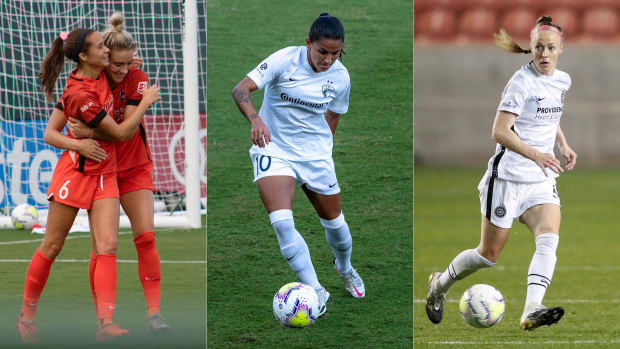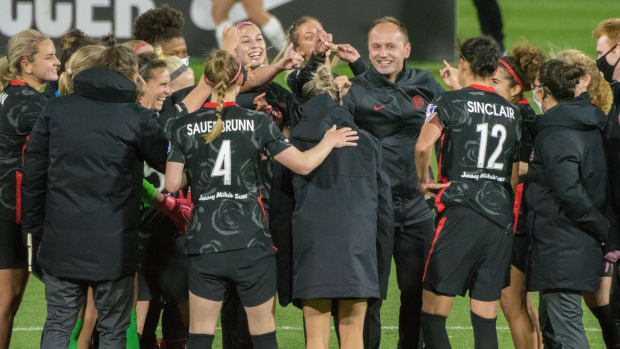After the Challenge Cup, the regular season and an expanded playoffs make up the rest of the NWSL calendar. Who will be the last one standing?
After a nearly six-month absence, the NWSL is back this Friday to kick off its ninth year. In a unique move, there will be a league-wide Challenge Cup tournament held before the regular season begins—though in a different form from its 2020 predecessor.
A year ago, the Challenge Cup served as the main competition of an unorthodox 2020 season, with a month-long, bubble-style summer tournament in Utah won by the Houston Dash. This time around, the Challenge Cup will consist of 21 games in home markets. The league’s 10 teams (welcome, expansion squads Racing Louisville and Kansas City, the latter of which took over the now-defunct Utah Royals’ roster—and also hello, NJ/NY Gotham FC, which just rebranded from Sky Blue FC!) will be split into two divisions, with the winner of each advancing straight to a championship game on Saturday, May 8. After the Challenge Cup, a traditional 24-game regular season will commence on May 15, with six teams (up from four) advancing to November’s playoffs.
Just like in 2019 and 2020, there will be some roster twists that impact both the Challenge Cup and the regular season. Right off the bat, the start of the Cup will be held during a FIFA international window, with the United States, Canada and England among the teams that will pull NWSL players away for friendlies. Then, assuming this summer’s Olympics in Tokyo take place, participating countries with NWSL-eligible players include the U.S., Canada, Brazil, Great Britain, Australia and New Zealand. The core USWNT players, in particular, figure to miss a significant chunk of the NWSL season due to early national team camp duties and a busy schedule of friendlies.
Because of the pending NWSL roster interruptions and uncertainty over who will make the Olympic rosters, it’s tough to fully assess the impacts those absences will have on each team in the regular season. The Portland Thorns, for example, could see five or six key players depart for a period of time, including stars Crystal Dunn, Lindsey Horan, Becky Sauerbrunn and Christine Sinclair. The Dash might be missing six of the 11 players who started last year’s Challenge Cup final; the Red Stars will almost certainly lose stalwarts Julie Ertz and Alyssa Naeher, at minimum, and so on.
For our 2021 NWSL Crystal Ball, we took these pending absences and team depth into account, while also heavily weighing what these teams’ abilities are at full strength—as they would be for the start of the regular season, the season’s final stretch and the all-important playoffs. It’s difficult to get a perfect picture, but this is our best gauge of where things stand for 2021:

NWSL 2021 PRESEASON RANKINGS
1. Portland Thorns: They overachieved at the Challenge Cup with a group missing some of its biggest stars. Now it adds the dynamic Dunn, and the experience its younger players got in 2020 will pay dividends when those aforementioned stars are in Tokyo.
2. Chicago Red Stars: Rory Dames brought in Mal Pugh to score goals, and if she (injury status pending) and players like Kealia Watt and Katie Johnson can do it consistently, the Red Stars absolutely will be a legitimate contender. If not? It could be a frustrating season in Chicago, though this roster should easily make the playoffs. It has the depth to survive, if not thrive, in the Olympic window, and it should once again field one of the league’s best defenses.
3. North Carolina Courage: The Courage will look a lot different in 2021, with no Dunn, Sam Mewis, Abby Dahlkemper or Jaelene Daniels. Their days of pure dominance may be over, but until further notice, there’s no reason to get too down on a roster that has Abby Erceg, Debinha and Lynn Williams leading each line, and manager Paul Riley pulling the strings. The attack should be fine, but this team’s ceiling likely will be set by its defensive adjustments.
4. Houston Dash: It might’ve been only 11 games, but it feels like this franchise turned a corner in 2020. With little offseason turnover for once, the Dash look primed to get off to a fast start in the regular season, which may be a necessity given all they will potentially lose during the Olympics. Nichelle Prince is one of the league’s most underrated players, and Shea Groom and Veronica Latsko will likely be relied on greatly to produce goals this summer.
5. OL Reign: Under a new coach, the Reign took a while to find their footing in 2020, scoring just one goal at the Challenge Cup. This remains a solid roster on paper (one that might see midseason additions from European giant Olympique Lyon), and, if it clicks on the field under Farid Benstiti’s vision, it should be playoff-bound. The Reign may be the biggest wild card heading into 2021.
6. Washington Spirit: The Spirit had a busy offseason, saying goodbye to Rose Lavelle (who is at Manchester City, anyway) and bringing in USWNT defenders Kelley O’Hara and Emily Sonnett. Washington’s young core will continue to mature under Richie Burke, and the trades were a signal that the rebuild is officially over. But to take the next step, it needs at least one of the Ashleys (Hatch and Sanchez) to be a consistent scorer.
7. NJ/NY Gotham FC: Reacquiring Jennifer Cudjoe after losing her in the expansion draft and signing intriguing South Korean international Lee So-dam were crucial for its midfield after losing stalwart Sarah Woldmoe. It appears Midge Purce will finally be playing at forward, where she can lead the attack, but the biggest questions are on defense for the artist formerly known as Sky Blue FC. A right quad injury sidelining Kailen Sheridan indefinitely is significant, as she’s arguably the NWSL’s top goalkeeper and has papered over shaky backline moments in the past.
8. Orlando Pride: The Pride have had a rough go of it the last couple of years and used a somewhat-experimental roster in their only four games of 2020. (They missed the Challenge Cup due to COVID-19.) It’s hard to get a true feel on how much this team may improve from a disastrous 2019, but it’s got some young talent to go along with the likes of veterans Marta, Alex Morgan, Sydney Leroux, Ali Krieger and Ashlyn Harris. If it can avoid an onslaught of goals, progress should come under Marc Skinner.
9. Kansas City: K.C. (which, again, inherited the Royals’ roster and does not yet have a nickname) faces an uphill climb in its first year. Vero Boquete has moved on, and the team traded promising rookie Tziarra King for Darian Jenkins. Jenkins and Michele Vasconcelos are good adds, and, together with Amy Rodriguez, they will need to do the heavy lifting on offense. Coach Huw Williams’s NWSL background should make for an easier first-year adjustment, so the potential is there to overachieve.
10. Racing Louisville FC: After going through the expansion draft, Racing has some intriguing pieces, particularly its talent on the front line (Yuki Nagasato, Savannah McCaskill, CeCe Kizer and Cheyna Matthews) and 2021 No. 1 draft pick Emily Fox, who presumably will play in defense. But there are a lot of questions and unproven pieces elsewhere, and depth is a major, major question right now. More than anything, Louisville’s debut season will simply be about getting its feet wet and building for the future.

SEASON PREDICTIONS
Playoff Champion: Portland Thorns
At full strength, the Thorns look formidable: Dunn, Horan, Sophia Smith, Sinclair, Rocky Rodríguez, Simone Charley and more in the midfield and attack; a steady defense with the likes of Sauerbrunn, Meghan Klingenberg, Emily Menges, Christen Westphal and Kelli Hubly; and both Adrianna Franch and 2020 Challenge Cup standout Bella Bixby as options in goal. With the Courage roster weakened, Portland seems poised to take the crown as the best team in the league on paper. The Thorns scored 10 goals in four fall series games, and that was before adding Dunn. They will have some work to do while their U.S. players are on what’s likely to be an extended Olympic break, but so will a lot of teams. Mark Parsons will need to figure out his team’s attack during that span, but regardless, Portland has more than enough to soar into the playoffs, when it can throw its full power at opponents.
MVP: Debinha, North Carolina Courage
We also strongly considered Dunn here, but the USWNT players figure to miss a significant portion of the season due to Olympics commitments (Debinha’s Brazil will also participate, but non-U.S. national teams tend to not remove their players from league play for as long as the U.S. does). The Courage lost several pieces from their dominant run, but don’t count on Debinha to miss a beat. She’s a maestro in the midfield who can score from anywhere if you give her the space (and, sometimes, even if you don’t).
Coach of the Year: James Clarkson, Houston Dash
Clarkson would’ve been a shoo-in for this award if there had been a 2020 version. If he steers the Dash to a top-four finish to continue their upward trajectory, he’ll be recognized for it.
Rookie of the Year: Brianna Pinto, NJ/NY Gotham FC
This year’s rookie class is unique, because some of the 2021 drafted players aren’t joining their teams until after their spring NCAA seasons (moved from fall 2020 due to COVID-19), and others not until 2022 after playing college soccer one more year in the fall. Rookie of the Year tends to favor an offensive player, and Pinto, of UNC, was a terrific value for Gotham with pick No. 3. She is playing out her spring season with the Tar Heels but will then arrive in New Jersey and have a chance to have an early impact in the NJ/NY midfield for coach Freya Coombe.
Golden Boot: Shea Groom, Houston Dash
In an Olympic year, we’ll go outside the box a bit here and say Groom, who should be in Houston the entire season, provided she stays healthy. Groom scored six goals in a resurgent 11-game 2020 run, joining the Dash and stepping right into a key offensive role. Houston will likely be missing several attacking players during the Olympics, and it’ll need Groom to help carry the load. However, don’t be surprised if Debinha, Williams or one of Portland’s attackers swipes this prize even with an Olympic break, or perhaps a dark horse like Purce, Pugh or OL Reign’s Bethany Balcer.